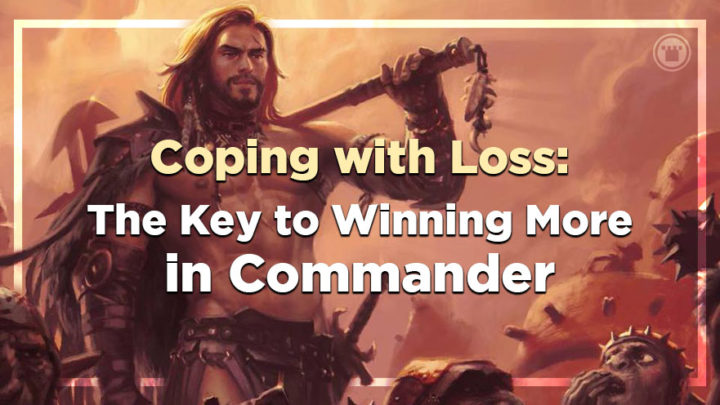Winning feels great. Even in more social situations, like a friendly game of Commander, it can feel good to win. It’s one of the most direct forms of confirmation that you are a good player. Focusing on the win is perfectly fine in most 1v1 formats, but with four players in the average game of Commander, the typical win rate is around 25%; this means that you should expect to lose three times more than you win.
Many people tie the idea of being a good player exclusively to winning, so much so that it could lead to a lack of enjoyment when losing. When the average win percentage is much lower in Commander, it can lead to a disproportionate number of unenjoyable games. Worse still, it could have a negative impact on the play experience for the whole table. This needn’t be the case, however; those feelings can come from more than just the winner’s circle, but they’re a bit more understated. Being a good player can mean different things to different people: being a good deck builder, playing well, or finding the right line at a tense moment. Essentially, you don’t need to be the unanimous victor to have a positive and enjoyable experience.
I’ll be talking about a few different ways you can derive more enjoyment from each game of Commander that you play. Even if you don’t win, most games will still feel like you did!
Find What Matters To You
Before becoming a Commander player, I played competitive Constructed formats exclusively. I was introduced to the game through Standard, and I branched out to Modern and Pioneer over time. My primary focus was on winning, and a lot of my enjoyment came from building something new or tuning a deck that could contend with the best decks.
This is where I first realized that there’s more to Magic than just winning every game. Even if I lost some of my games, I felt accomplished; knowing that I was able to go toe-to-toe with heavyweights like The Scarab God in Standard or Tron in Modern was enough to make me feel like I was doing well. This to me was what became my personal mental model of a good player.
This mindset can translate well to many formats, especially Commander. You can bring a strange or exciting new build to the table and wow your opponents with its performance. My Laelia, the Blade Reforged deck is a perfect example of building outside the box, while still striving for greatness. It was originally built out of curiosity, but once I saw there was true potential in it, I focused on making the deck as impressive as possible. She now wins her fair share of games, and each one of them feels that much sweeter, knowing that I turned the deck from a silly experiment into a genuine powerhouse. Every player that has faced the deck has loved it and found the whole experience to be engaging and exciting! The experience has really reinvigorated my relationship with Magic, and reminded me of everything I love about it.
Victory Isn’t Tied To Winning
Not all wins come in the form of your opponents scooping to your combo or lethal attack. Players that focus on table politics are a great example: they derive great joy from talking their opponents into trouble, and talking themselves out of it. They’re dictating the pace and outcome of the game, often without using the game’s built-in mechanics. That feeling of power is unlike the experience you’ll have in any other format, and it’s a huge draw to Commander. Even if you don’t win the game, each diplomatic resolution you achieve counts as a form of victory.
Even if you’re not a persuasive or political player, there are a number of other ways you can derive fulfilment from every game, regardless of the outcome. You could find satisfaction in navigating a particularly tricky situation, or learning about a new interaction. You could even find a new combo hidden in one of your own decks! Finding those little victories without needing to win the game is a skill that will bolster the Commander experience, both for you and your playgroups.
Prioritizing what matters to you is key to enjoying more games. It’s also important to remember that people’s interests and motivations change over time. Be sure to reassess your own reasons for playing from time to time, and make sure you’re still playing in a way that can satisfy those goals!
Make An Enjoyment Checklist
For many players, Commander can also be about the spectacle. As Kristen mentioned in her Commander Player Profiles article, some players find joy in maximizing the whole table’s enjoyment. It feels good to make others happy, or to keep them entertained! If you haven’t tried to take the fun or chaotic line over the technically correct play, I urge you to get a game going as soon as possible to try it out.
I have a recent example of taking the chaotic line for entertainment value. I was playing a game with my Glacian, Powerstone Engineer and Toggo, Goblin Weaponsmith deck, and one of my opponents started to go off with their deck. They were at 34 life, I was at 32, and the other two players were lower still, so they tried to end the game with a Rolling Earthquake for 32 damage. With the spell on the stack, I sacrificed the rock I had equipped to Toggo, bringing their life total down to match mine. This brought the game to a four way draw! The other two players were thoroughly entertained by such a hilarious play, and the Marath player was in hysterical shock. Rather than just striking it down as a loss like any other, I saw the opportunity to turn it into a story. I’ll remember this game more fondly than many games that I won the old-fashioned way!
There are myriad ways to generate enjoyment in a game of Commander, and part of it is tied to your playgroup’s enjoyment. A checklist for Commander games can be an excellent visual aid for making sure you’re working towards the greater good: the entertainment of the table.
- Am I enjoying myself?
- Do the other players seem like they’re enjoying themselves?
- Was everyone able to do a bit of their own thing?
- Is anyone falling behind, or being unnecessarily targeted?
- Am I assessing threats fairly?
- Has enough time passed that going for the win will be okay?
This checklist may even alter how you interact in a game. Maybe you won’t attack early to get some free points of damage through on a mana-screwed opponent, or maybe you won’t combo off on turn four. It won’t affect how every game will play out — especially at higher power level tables — and it’s not suitable for every player. But it does have a number of applications outside of casual games and tables. This mindset can be closely linked to your intentions as a Commander player; I cover this in detail in my recent article on the subject, if you’d like to read more. It’s important to note, however, that the more enjoyable you are to play with, the more people will want to play with you, which can be just as validating as any win, if not more.
Does The Win Even Matter?
This may seem like a ridiculous question, but it’s one worth asking. In competitive formats, there are often prizes on the line or milestones you’d like to achieve. In circumstances like this, the win absolutely does matter: it’s the means through which you reach your goal.
When you’re sitting down to play a game of Commander, this mindset generally doesn’t apply, as there is no material benefit to winning. You can absolutely aim to win, and approach each game and play with the intention to succeed, but it doesn’t need to dictate whether you enjoy yourself or not. I have seen many cEDH players most enjoy the games where they learn something new, or talk out a series of plays that could result in a win.
This isn’t to say that winning doesn’t matter, but rather it’s not all that matters. The end of the game is the destination, and Commander is all about the journey. The win is just a badge you can wear until the next game finds its winner.

Scott is an Irish content creator and the Head of Budget Magic for the Izzet League. He focuses on affordable decks in Pioneer, Modern, and Pauper, particularly ones that stray from the mainstream. When he’s not writing about his favorite decks, he can be found talking incessantly about them on Twitter and on The Budget Magic Cast.

